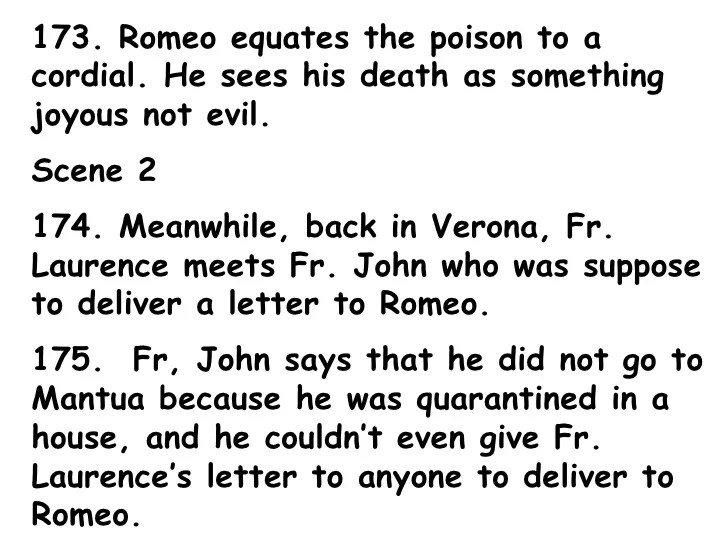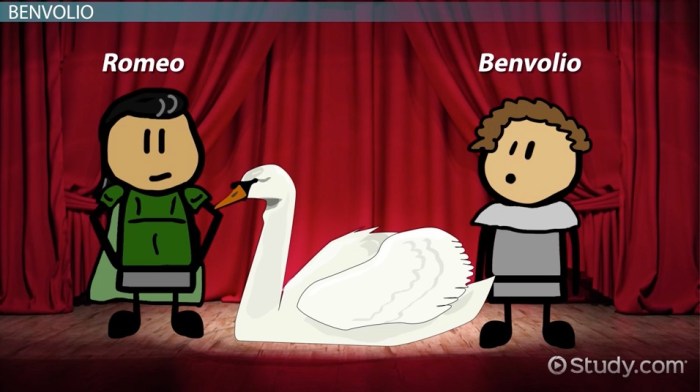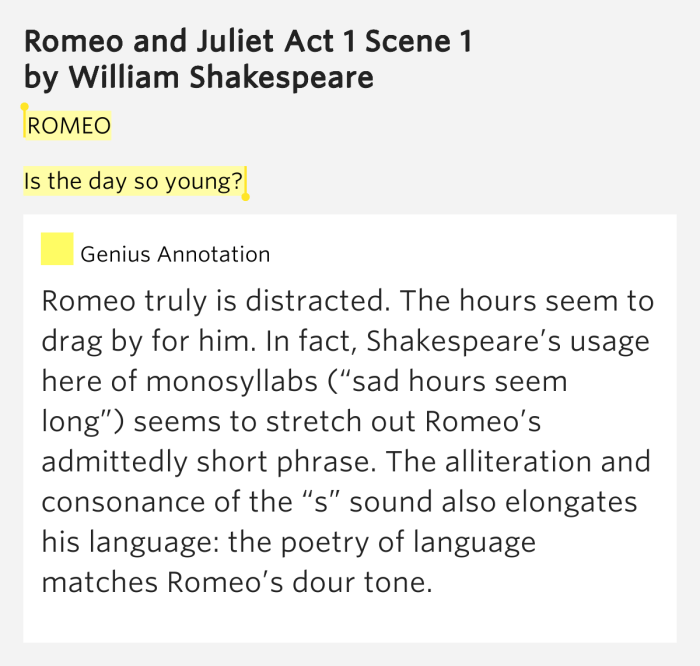Hyperbole in romeo and juliet act 1 – Hyperbole in Romeo and Juliet: Act 1 sets the stage for this enthralling narrative, offering readers a glimpse into a story that is rich in detail and brimming with originality from the outset. Shakespeare’s skillful use of hyperbole intensifies emotions, creates a sense of urgency, and conveys the characters’ heightened feelings, immersing the reader in the drama and passion that unfolds.
Identify and Define Hyperbole
Hyperbole is a figure of speech that employs exaggerated statements or claims to emphasize a point or create a vivid impression. In literature, hyperbole is often used to convey strong emotions, create humor, or intensify a particular idea.
In Act 1 of Romeo and Juliet, hyperbole is employed extensively to convey the intensity of the characters’ emotions and the dramatic nature of the events.
Examples of Hyperbole in Act 1
- “My bounty is as boundless as the sea, / My love as deep; the more I give to thee, / The more I have, for both are infinite.” (Romeo, Act 1, Scene 2)
- “When he shall die, / Take him and cut him out in little stars, / And he will make the face of heaven so fine / That all the world will be in love with night / And pay no worship to the garish sun.”
(Romeo, Act 1, Scene 2)
- “Did my heart love till now? for I ne’er saw / True beauty till this night.” (Romeo, Act 1, Scene 5)
These examples of hyperbole serve to highlight the intensity of Romeo’s love for Juliet, the beauty he perceives in her, and the transformative power of their meeting.
Analyze the Dramatic Impact of Hyperbole

Hyperbole, an exaggerated statement that emphasizes a point, plays a significant role in shaping the dramatic impact of Romeo and Juliet. It intensifies emotions, creates a sense of urgency, and conveys the characters’ heightened feelings.
Intensifying Emotions
Hyperbole amplifies emotions by expressing them in exaggerated terms. For instance, Romeo declares, “Did my heart love till now? For I ne’er saw true beauty till this night.” This hyperbole conveys the intensity of Romeo’s love at first sight, making it more powerful and unforgettable.
Creating a Sense of Urgency
Hyperbole creates a sense of urgency by depicting situations as more dire or imminent than they may be. For example, when Juliet learns of Romeo’s banishment, she exclaims, “O God! Did Romeo’s hand shed Tybalt’s blood? / It shall be thine, or Romeo’s dismal day.”
This hyperbole conveys Juliet’s desperation and determination to avenge Romeo, highlighting the urgency of the situation.
Conveying Heightened Feelings, Hyperbole in romeo and juliet act 1
Hyperbole captures the heightened emotions of the characters by using exaggerated language. For instance, Romeo says to Juliet, “My bounty is as boundless as the sea, / My love as deep.” This hyperbole expresses Romeo’s immense love for Juliet, emphasizing its boundless and eternal nature.
Compare and Contrast Hyperbole in Romeo and Juliet to Other Literary Works

Hyperbole, the use of exaggeration for emphasis or effect, is a literary device commonly employed in various works of literature. In Romeo and Juliet, hyperbole plays a significant role in conveying the intensity of the characters’ emotions and the heightened language of the play.
Hyperbole in Other Literary Works
Hyperbole is not unique to Romeo and Juliet; it has been used throughout literary history to create vivid imagery and evoke strong emotions. Some notable examples include:
- The Iliadby Homer: “His spear was like a beam of sunlight, and his shield like the full moon.”
- The Canterbury Talesby Geoffrey Chaucer: “His beard was like a bush that had not been trimmed for a year.”
- Hamletby William Shakespeare: “I could have such a fellow shot over the Azures, even to the moon.”
Comparison and Contrast
The use of hyperbole in Romeo and Juliet differs from these other works in several ways:
- Frequency and Intensity:Hyperbole is used more frequently and with greater intensity in Romeo and Juliet than in the other examples. The characters’ emotions are so overwhelming that they resort to extreme exaggeration to express themselves.
- Purpose:In Romeo and Juliet, hyperbole is primarily used to convey the characters’ passionate love and despair.
In other works, it may be used for humor, satire, or to emphasize a particular point.
- Dramatic Impact:The use of hyperbole in Romeo and Juliet heightens the drama and creates a sense of urgency. It makes the characters’ emotions more relatable and allows the audience to connect with their experiences.
Create a Table of Hyperbole in Act 1: Hyperbole In Romeo And Juliet Act 1

Hyperboles are exaggerated statements that are used to create emphasis or effect. They are a common literary device in Romeo and Juliet, and they can be found throughout the play.The following table lists some of the hyperboles from Act 1, along with their speakers and contexts:| Hyperbole | Speaker | Context ||—|—|—|| “My heart is full of woe” | Romeo | After learning that Rosaline does not love him || “I have lost myself; I am not here; this is not I” | Romeo | After meeting Juliet || “I am afeard, so that I dare not speak” | Juliet | After Romeo declares his love for her || “My bounty is as boundless as the sea” | Juliet | After Romeo vows to love her forever || “I have seen more days than thou” | Mercutio | To Romeo, after he complains about being in love || “I am fortune’s fool” | Romeo | After Tybalt kills Mercutio || “I will kiss thy lips” | Romeo | To Juliet, after she awakens from her feigned death || “I will never rest until I find him” | Juliet | After Romeo is banished from Verona || “I will die with thee” | Juliet | To Romeo, after he is poisoned || “My love is deeper than the ocean” | Romeo | To Juliet, after they are reunited in heaven |These hyperboles help to create a sense of urgency and passion in the play.
They also help to convey the characters’ emotions, and they can be used to foreshadow events that will happen later in the play.
Illustrate the Visual Impact of Hyperbole

Hyperbole in Romeo and Juliet Act 1 creates a vivid and exaggerated portrayal of emotions and events. To illustrate the visual impact of this literary device, we can design a visual representation that conveys the intensity and excess of the language used.
Visual Representation
Consider a visual representation that incorporates images, colors, and graphics to convey the hyperboles in Act 1. For instance, the image of a heart pierced by an arrow could represent Romeo’s exaggerated description of love as “a shot from heaven.”
The use of bright red and gold colors could evoke the intensity and passion expressed in the hyperboles. Additionally, graphics such as flames or stars could symbolize the exaggerated emotions of the characters.
By creating a visual representation, we can enhance the understanding and appreciation of the hyperboles in Act 1. The visual impact helps readers grasp the exaggerated and intense nature of the language, adding to the dramatic effect of the play.
FAQs
What is the purpose of hyperbole in literature?
Hyperbole is used to exaggerate or overstate a point for emphasis or dramatic effect, creating a sense of urgency or heightened emotions.
How does hyperbole intensify emotions in Romeo and Juliet?
Hyperbole amplifies the characters’ feelings, making their love, sorrow, and anger more palpable and relatable to the audience.
What is the significance of the hyperbole “My bounty is as boundless as the sea”?
This hyperbole conveys Romeo’s overwhelming love for Rosaline, emphasizing the depth and intensity of his affection.